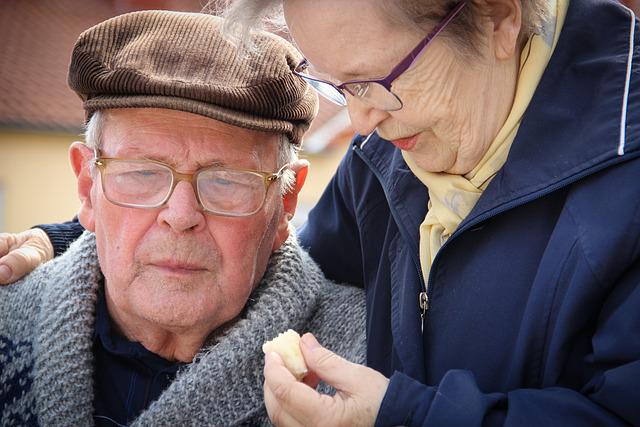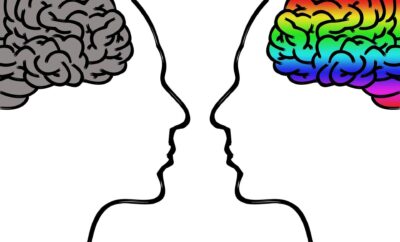Let’s Talk About Alzheimer’s Communication
You may have had a family member or friend diagnosed with Alzheimer’s, and you probably have many questions. One of the most common questions people have is regarding Alzheimer’s communication.
You are learning Alzheimer’s Disease isn’t just about forgetting things but slowly destroying different brain parts.
This disease changes several areas in the brain, including the temporal lobe in the brain. The temporal lobe’s primary functions include understanding language, memory acquisition, face recognition, object recognition, perception, and auditory information processing.
So over the years, you will see many changes in their communication skills.

How Does Alzheimer’s Affect Communication?
In the early stages of Alzheimer’s, the changes are just beginning. These changes usually make friends, and family members question if there is a problem. They begin to struggle to find the right word and lose their train of thought quickly. Increased concentration is needed to participate in a conversation. Difficulty describing familiar objects begins, and they will start calling well-known items by a different names.
There may not be an official diagnosis yet, but they usually feel something is wrong.
Changes in the Middle Stage are an increase in the problems which surfaced in the early stage. Instead of struggling to find a word and an alternative term, they now can’t find any word. Words are losing their meaning, are in the wrong order, or become so jumbled up that it doesn’t make any sense.
Verbal communication in the late stage is rare. The ability to understand most words is gone. Often, they become mute and are unable to speak any words. Others may have a few words they can still say, but they usually don’t know the meaning behind the word. Some people will keep a single word, and often that word is no. Repeating a single word over and over in the late stage is very common.
When Do They Lose Their Ability To Communicate
In the early stage, the person will begin to speak less often, and using hand gestures more often than speaking becomes one of their coping skills. Increased frustration is a typical response in this stage.
Next comes the middle stage, and communication begins to become more complex. Sentences are left unfinished and long conversations are too difficult for them. As a result, they rarely initiate conversations and respond to questions with 1-2 word answers. The days of having conversations are slowly fading away.
Lastly is the late stage. Conversations have become a thing of the past. There may be rare moments of being able to talk and answer appropriately, but they are few and far between.

How To Communicate With Alzheimer’s?
You can use different techniques and strategies to communicate with someone with Alzheimer’s or one of the other dementias. One technique is the positive approach technique. This technique focuses on a slow, friendly, calm approach to put the person with Alzheimer’s at ease. This approach will help them feel comfortable and non-threatened, decreasing their anxiety. However, failure to make them feel safe will interfere with their ability to talk when they become anxious.
There are a couple of common strategies to help prevent Alzheimer’s communication issues:
- Regardless of their stage, always talk to them as adults.
- Be aware of your body language, facial expressions, and tone of voice.
- Pay attention to their emotion and provide gentle encouragement as they try to get the words out.
Dos & Don’ts of Alzheimer’s Communication
Do:
- Remember, reason and logic are gone
- Ask simple yes or no questions
- Be patient
- Repeat or rephrase what they said back to them
- Ask who, what, when, where, how questions
- Focus on the feelings behind the words they are trying to get out
- Don’t interrupt or criticize
- Maintain your sense of humor
- Remain calm, pleasant, and patient
- Be connected and maintain eye contact
- Use their name when talking to them
- Use simple words
- Use praise and encouragement
- Use visual cues
- stick to one topic at a time
- Limit distractions
- Listen more and talk less
- Use humor if appropriate
Don’t:
- Don’t argue
- Don’t correct
- Don’t shame
- Don’t command- ask instead
- Don’t get frustrated -take a break
- Don’t ask why
- Don’t take it personal
- Don’t talk condescendingly
- Don’t talk as if they are a child
- Don’t try to reason (they can’t)
- Don’t question a memory – go along with it
- Don’t say remember…
- Don’t say I told you…
- Don’t interrupt and try to finish their sentence
- Don’t assume they can’t communicate normally

Nonverbal Alzheimer’s Communication
Non-verbal communication is communicating without the use of spoken words. Instead, it is your facial expressions, gestures, and body language.
As the disease progresses, they will lose the ability to recognize words. As a result, touch and vision cues become the primary form of communication at some point.
Families and caregivers need to recognize the need to change their communication styles. In the late stage, communication by touch will give them a sense of comfort. For example, a light pat on the arm or holding their hand provides a level of connection.

VIsual Cues
Visual cues can be hand gestures, cue cards, or picture books. Videos may be helpful too. An example would be if I wanted someone to wash their face, I would act like I was washing my face as a visual cue to them.
There are several types of cue cards and picture books available online.
Left brain vs. right brain
The two sides of your brain look very much alike but are entirely different. The left side of your brain is more analytical than the right side. It controls language, math, sequencing, and logic. In comparison, the right side of your brain is the more creative side of your brain. This side of your brain is where imagination, arts, rhythm, and daydreaming live.
Dementia affects the left side of the brain but not the right. The right side of your brain recognizes music. People with dementia recognize and enjoy music throughout all stages of the disease. Many families have found music and art to help communicate with their loved ones in the late stage of the disease.










0 Comments